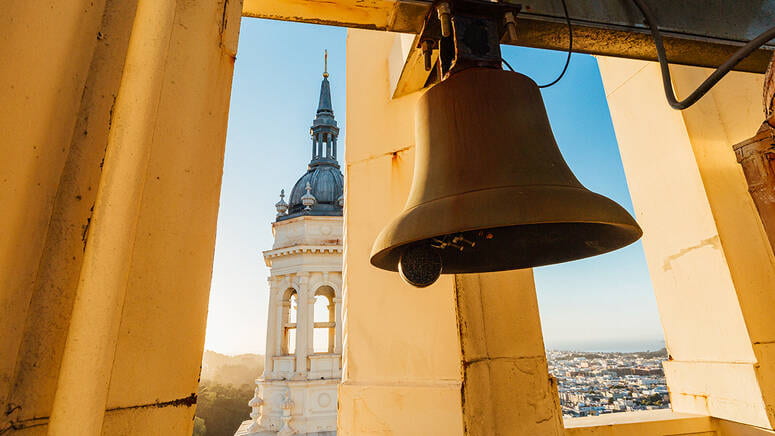In 1985, Peter Henriot, S.J., and colleagues at the Center of Concerns famously described Catholic Social Teaching as the Catholic Church’s “Best Kept Secret.” This phrase has reemerged in many contexts and conversations including the discussions that led to the formation of the Joan and Ralph Lane Center, as founding board member Mike Lehmann describes later in this volume. This observation emerged again at a conference hosted by the Lane Center this past February. Co-sponsored by the Jesuits West Province and Intercommunity Peace & Justice Center, “Prophetic Communities: Organizing As an Expression of Catholic Social Thought” brought together nearly 150 faith-based community organizers, lay and ordained ministers, scholars and educators, to reflect on the ways CST has inspired community organizing and the ways organizers have shaped CST.
Over three days of listening and sharing in a synodal model of conversation, participants shared their consolations and desolations during this moment in the life of the Catholic Church. Again and again, the desire for formation in the Catholic social tradition was named as an urgent need. The signs of the times frame this urgency as participants noted the polarization in U.S. politics and in the Catholic Church and the challenges to democracy and existential threat of climate change. The central themes of CST—a radical affirmation of human dignity and firm commitment to inclusive human flourishing through the common good—provide a prophetic response to the signs of the times. The conference made it clear that the stakes are high and the need for formation in CST is great.
So, how do we shine a light on CST so it becomes a well-known treasure of the Church rather than its best kept secret? Conference participants expressed a desire to encounter CST in embodied, affective, and integrated ways. Instead of presenting CST as a set of abstract principles, we need stories that champion human dignity and feature the poor and oppressed as protagonists. We need to experience transformative encounters of solidarity so that all of creation grows together as that virtue that orients us toward the common good.1
Pope Francis has embraced and modeled this pedagogy of encounter in the way he advances the Church’s social teaching. Using a concrete example most relevant to this context, Francis centers the voices of those engaged in the struggle for justice through popular movements. In his 2021 message to the World Meeting of Popular Movements, Francis encourages the world to listen to voices from the peripheries because “In my experience, when people, men and women, have suffered injustice, inequality, abuse of power, deprivations, and xenophobia in their own flesh—in my experience, I can see that they understand much better what others are
experiencing and are able to help them realistically to open up paths of hope.”2
In the same message, Pope Francis acknowledges with sadness that the Catholic social tradition is not fully known and embraced among Catholics. However, Francis highlights a problem that differs from CST being the best kept secret. He is particularly concerned that members of the Church find CST to be an “annoying” expression of the Gospel: “…principles such as the preferential option for the poor, the universal destination of goods, solidarity, subsidiarity, participation, and the common good. These are all ways in which the Good News of the Gospel takes concrete form on a social and cultural level. And it saddens me that some members of the Church get annoyed when we mention these guidelines that belong to the full tradition of the Church. But the Pope must not stop mentioning this teaching, even if it often annoys people, because what is at stake is not the Pope but the Gospel.”3
Pope Francis has boldly called on the Catholic Church to fully embrace and embody the Catholic social tradition in his field hospital ecclesiology. He integrates ecclesiology and social teaching by beckoning the Church toward the margins and naming his longing for a poor church for the poor. In doing so, he echoes the still-relevant words of the 1971 synod, “While the Church is bound to give witness to justice, she recognizes that anyone who ventures to speak to people about justice must first be just in their eyes.”4 It is my hope, which I share with the many organizers who gathered at USF this winter, that the praxis of organizing and synodality will help the Church embody and share CST with the world.
1. Pope John Paul II, Sollicitudo Rei Socialis (1987).
2. Pope Francis, “Message to the World Meeting of Popular Movements” (2021).
3. Ibid.
4. Synod of Bishops, Justice in the World (1971).
ERIN BRIGHAM is the director of the Joan and Ralph Lane Center for Catholic Social Thought and the Ignatian
Tradition and affiliate faculty in the Department of Theology and Religious Studies. Her most recent books include
Church as Field Hospital: Toward an Ecclesiology of Sanctuary (Liturgical Press, 2022) and Women Engaging the Catholic Social Tradition: Solidarity Toward the Common Good, co-edited with Mary Johnson (Paulist Press, 2022). She is currently studying the impact of the pandemic on faith and religious practices.

